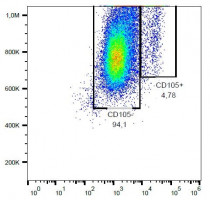ARG65508
anti-CD105 / Endoglin antibody [MJ7/18] (PE)
anti-CD105 / Endoglin antibody [MJ7/18] (PE) for Flow cytometry and Mouse
Cancer antibody; Cell Biology and Cellular Response antibody; Controls and Markers antibody; Developmental Biology antibody; Immune System antibody
Overview
| Product Description | PE-conjugated Rat Monoclonal antibody [MJ7/18] recognizes CD105 / Endoglin |
|---|---|
| Tested Reactivity | Ms |
| Tested Application | FACS |
| Specificity | The clone MJ7/18 reacts with CD105 (Endoglin), a 90 kDa type I homodimerizing membrane glycoprotein expressed on vascular endothelial cells (small and large vessels), activated monocytes and tissue macrophages, stromal cells of certain tissues including bone marrow, pre-B lymphocytes in fetal marrow and erythroid precursors in fetal and adult bone marrow. |
| Host | Rat |
| Clonality | Monoclonal |
| Clone | MJ7/18 |
| Isotype | IgG2a |
| Target Name | CD105 / Endoglin |
| Antigen Species | Mouse |
| Immunogen | Inflamed mouse skin |
| Conjugation | PE |
| Alternate Names | CD antigen CD105; HHT1; Endoglin; ORW1; END |
Application Instructions
| Application Suggestion |
|
||||
|---|---|---|---|---|---|
| Application Note | * The dilutions indicate recommended starting dilutions and the optimal dilutions or concentrations should be determined by the scientist. |
Properties
| Form | Liquid |
|---|---|
| Purification Note | The purified antibody is conjugated with R-Phycoerythrin (PE) under optimum conditions. The conjugate is purified by size-exclusion chromatography. |
| Buffer | PBS (pH 7.4) and 15 mM Sodium azide |
| Preservative | 15 mM Sodium azide |
| Concentration | 0.5 mg/ml |
| Storage Instruction | Aliquot and store in the dark at 2-8°C. Keep protected from prolonged exposure to light. Avoid repeated freeze/thaw cycles. Suggest spin the vial prior to opening. The antibody solution should be gently mixed before use. |
| Note | For laboratory research only, not for drug, diagnostic or other use. |
Bioinformation
| Database Links | |
|---|---|
| Gene Symbol | Eng |
| Gene Full Name | endoglin |
| Background | CD105 (Endoglin) is a homodimeric transmembrane glycoprotein serving in presence of TGFbetaR-2 as a receptor for TGFbeta-1 and TGFbeta-3. CD105 is highly expressed on endothelial cells and promotes angiogenesis during wound healing, infarcts and in a wide range of tumours and its gene expression is stimulated by hypoxia. CD105 prevents apoptosis in hypoxic endothelial cells and also antagonises the inhibitory effects of TGFbeta-1 on vascular endothelial cell growth and migration. Normal cellular levels of CD105 are required for formation of new blood vessels. |
| Function | Major glycoprotein of vascular endothelium. Involved in the regulation of angiogenesis. May play a critical role in the binding of endothelial cells to integrins and/or other RGD receptors. Acts as TGF-beta coreceptor and is involved in the TGF-beta/BMP signaling cascade. Required for GDF2/BMP9 signaling through SMAD1 in endothelial cells. [UniProt] |
| Research Area | Cancer antibody; Cell Biology and Cellular Response antibody; Controls and Markers antibody; Developmental Biology antibody; Immune System antibody |
| Calculated MW | 71 kDa |
Images (1) Click the Picture to Zoom In
Clone References








